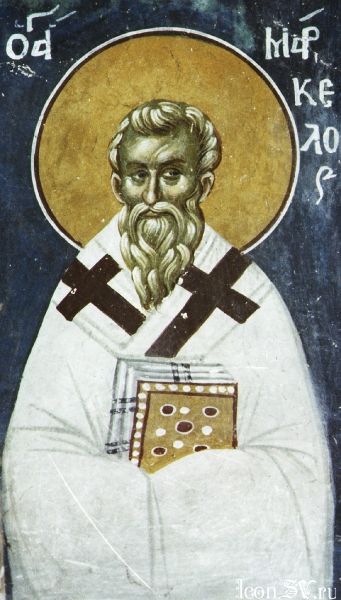
Saint Marcellus, igumen of the Monastery called "the Unsleeping Ones," was a native of the city of Apamea in Syria. His parents were wealthy, but died when he was young. He received his education first at Antioch, and then at Ephesus. All his possessions left him by his parents he distributed to the poor, thereby sundering his ties to the world.
Under the guidance of an experienced elder at Ephesus, Marcellus entered upon the path of asceticism. He later went on to Byzantium to St Alexander, igumen of the monastery named "the Unsleeping." The monastery received its name because in it psalmody was done constantly, both day and night, by alternating groups of monks. St Alexander accepted Marcellus and tonsured him into the monastic schema. Zealous in the works of watchfulness, fasting and prayer, the saint received great spiritual talents and the gift of clairvoyance. Marcellus foresaw the day of Abba Alexander's death and his own election as igumen. However, since he was still young, he did not want to rule others. So he slipped out of the monastery to visit other provinces and other monasteries, where he received edification from the monks who lived there.
After the death of St Alexander, when Abba John had already been chosen as igumen, Marcellus returned to the great joy of the brethren. Abba John made Marcellus his own closest assistant. After John's death, St Marcellus was chosen igumen of the monastery in spite of his own wishes, and in this position he remained for sixty years.
News of his saintly life spread far. People came to Marcellus from afar, both the illustrious and the common, rich and the poor. Many times they saw angels encircling the saint, attending and guarding him. With the help of God, the monastery of "the Unsleeping Ones" flourished. So many monks came to place themselves under the direction of St Marcellus that it became necessary to enlarge the monastery and the church.
St Marcellus received donations from believers for expansion, and built a beautiful large church, a hospital, and a hostel for the homeless. By his prayers the monk treated the sick, cast out devils and worked miracles. For example, one of the monks was sent to Ankara and fell ill. Being near death, he called out mentally to his abba. At that very hour St Marcellus heard his disciple in the monastery, and he began to pray for him. He who was sick recovered at once.
When a ship with his monks came into danger on the Black Sea, the saint calmed the tempest by his prayers. Another time, when they told him that a fire was raging at Constantinople, he prayed tearfully for the city, and the fire subsided as if extinguished by the tears of the monk.
John, the servant of a certain Arian nobleman named Ardaburios, was unjustly accused of something, and he hid out at the monastery to escape his master's wrath. Ardaburios twice demanded that St Marcellus hand John over to him, but he refused. Ardaburios then sent out a detachment of soldiers, who surrounded the monastery, threatening to slay anyone who interfered with their mission. The brethren went to the abba, asking him to surrender John and save the monastery. St Marcellus signed himself with the Sign of the Cross, then boldly went out alone through the monastery gate towards the soldiers. Lightning flashed in the sky, thunder rumbled, and the Cross appeared shining brighter than the sun. The soldiers threw down their weapons and took to flight. Ardaburios, learning from the soldiers what had happened, was frightened, and because of St Marcellus he pardoned the servant.
St Marcellus peacefully departed to the Lord in the year 485. His faithful disciple Lukian grieved terribly over him, but on the fifth day after the death St Marcellus appeared to him and comforted him, foretelling his own impending end.
 Saint Marcellus, igumen of the Monastery called "the Unsleeping Ones," was a native of the city of Apamea in Syria. His parents were wealthy, but died when he was young. He received his education first at Antioch, and then at Ephesus. All his possessions left him by his parents he distributed to the poor, thereby sundering his ties to the world.
Saint Marcellus, igumen of the Monastery called "the Unsleeping Ones," was a native of the city of Apamea in Syria. His parents were wealthy, but died when he was young. He received his education first at Antioch, and then at Ephesus. All his possessions left him by his parents he distributed to the poor, thereby sundering his ties to the world.